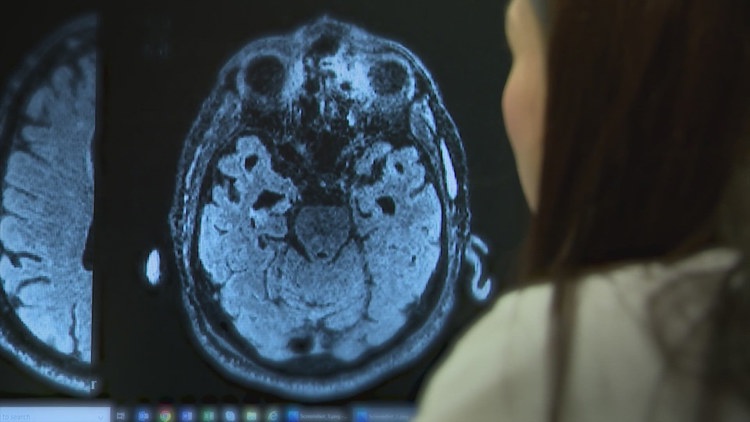Science
Texas Voters Face $3 Billion Proposition for Dementia Research

A significant decision awaits Texas voters on November 5, 2024, as Proposition 14 seeks approval for a transformative investment of $3 billion aimed at enhancing dementia and Alzheimer’s research. If passed, this funding could lead to groundbreaking advancements in understanding and treating these conditions, reshaping the future of healthcare in the state.
The proposition has emerged from a growing recognition of the urgent need to address dementia, which affects millions of individuals and their families. Current estimates suggest that over 450,000 Texans are living with Alzheimer’s disease, a number that is expected to rise sharply in the coming years. The proposed funding aims to not only support ongoing research in Texas but also attract global talent and investment in the state’s healthcare sector.
Investment Aims to Revolutionize Research
One of the central goals of Proposition 14 is to establish a comprehensive funding structure that can facilitate innovative research projects focused on dementia and Alzheimer’s. This initiative represents a potential shift in how Texas approaches these complex health issues. By investing heavily in research, proponents argue that Texas can become a leader in identifying new treatments and care strategies.
The funds would be allocated to various Texas universities and research institutions, promoting collaboration among scientists, clinicians, and policymakers. This collaborative environment is expected to yield significant scientific breakthroughs, enhancing the quality of life for patients and their families.
Moreover, the proposition includes provisions for public engagement, ensuring that the voices of those affected by dementia are heard in shaping research priorities. Advocacy groups have indicated that this focus on community involvement is crucial for developing effective solutions that truly address the challenges faced by patients and caregivers.
Broad Support and Future Implications
Support for Proposition 14 has grown among various stakeholders, including healthcare professionals, researchers, and advocacy organizations. Many see it as a pivotal moment for dementia research in Texas, with the potential to significantly impact both local economies and public health.
If passed, the expected economic benefits could be substantial. The influx of research funding could lead to job creation in various sectors, ranging from healthcare to biotechnology. Furthermore, advancements in dementia research could reduce long-term healthcare costs associated with caring for patients, ultimately benefiting taxpayers and the state’s economy.
Critics of the proposition have raised concerns about the management of such a large investment and the accountability measures in place to ensure funds are used effectively. Addressing these concerns will be vital for building public trust in the initiative.
As Texas prepares for this crucial vote, the implications of Proposition 14 extend beyond state lines. The outcome may influence similar initiatives across the United States and potentially impact global dementia research efforts. The decision to invest in this area of health could set a precedent for how other states and countries prioritize research funding for critical health challenges.
In conclusion, Texas voters face a momentous choice that could redefine the landscape of dementia research. With $3 billion on the line, the passage of Proposition 14 could usher in a new era of hope for those affected by Alzheimer’s and dementia, marking a significant commitment to addressing one of the most pressing health issues of our time.
-

 Sports2 weeks ago
Sports2 weeks agoSteve Kerr Supports Jonathan Kuminga After Ejection in Preseason Game
-

 Politics2 weeks ago
Politics2 weeks agoDallin H. Oaks Assumes Leadership of Latter-day Saints Church
-

 Business2 weeks ago
Business2 weeks agoTyler Technologies Set to Reveal Q3 2025 Earnings on October 22
-

 Science2 weeks ago
Science2 weeks agoChicago’s Viral ‘Rat Hole’ Likely Created by Squirrel, Study Reveals
-

 Lifestyle2 weeks ago
Lifestyle2 weeks agoKelsea Ballerini Launches ‘Burn the Baggage’ Candle with Ranger Station
-

 Lifestyle2 weeks ago
Lifestyle2 weeks agoDua Lipa Celebrates Passing GCSE Spanish During World Tour
-

 Entertainment2 weeks ago
Entertainment2 weeks agoZoe Saldana Advocates for James Cameron’s Avatar Documentary
-

 Health2 weeks ago
Health2 weeks agoRichard Feldman Urges Ban on Menthol in Cigarettes and Vapes
-

 Health2 weeks ago
Health2 weeks agoCommunity Unites for Seventh Annual Mental Health Awareness Walk
-

 World2 weeks ago
World2 weeks agoD’Angelo, Iconic R&B Singer, Dies at 51 After Cancer Battle
-

 Business2 weeks ago
Business2 weeks agoMLB Qualifying Offer Jumps to $22.02 Million for 2024
-

 Sports2 weeks ago
Sports2 weeks agoPatriots Dominate Picks as Raiders Fall in Season Opener








